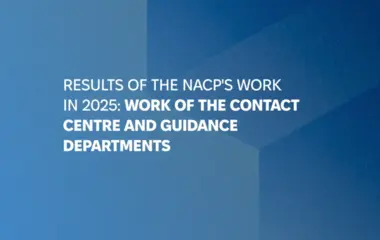23 June is World Whistleblower Day. Whistleblowers are the first to uncover corruption schemes from within, but they often face pressure, persecution or unlawful dismissal. Therefore, the NACP works systematically to ensure comprehensive protection of their rights.
In accordance with Article 53 of the Law of Ukraine ‘On Prevention of Corruption,’ whistleblowers are entitled to state protection in the event of a threat of negative measures related to reporting possible facts of corruption. Such measures include, in particular:
- dismissal or coercion to resign;
- transfer without the employee's consent;
- reduction of salary;
- other forms of unfavourable influence by the employer.
These guarantees also apply to the whistleblower's close relatives if a causal link is established between the report of corruption and the relevant actions. At the same time, the law does not provide absolute immunity from disciplinary or other liability for deliberate violations of labour discipline or legislation.
Competence of the NACP in the field of whistleblower protection
The National Agency implements a set of measures to enforce legal protection mechanisms for whistleblowers:
- investigates circumstances that may indicate persecution in connection with reporting corruption;
- based on the results of investigations, issues orders requiring the elimination of violations and bringing those responsible to justice;
- provides advisory explanations to whistleblowers;
- represents their interests in court proceedings;
- coordinates interaction with authorised persons on corruption prevention issues;
- monitors the implementation of the law on whistleblower protection on an ongoing basis and conducts an annual analysis and review of state policy in this area.
Statistics for 2024 show that the NACP has been active in protecting whistleblowers. The Agency received 46 requests for protection of whistleblowers. It is important to note that only in 16 cases was their status confirmed, which highlights the need for requests to meet the legal criteria. In 30 cases, the rights and guarantees of whistleblower protection did not apply to the individuals concerned. During its inspections, NACP sent seven warning letters to the employers of whistleblowers to prevent violations of the law.
In total, in 2024, NACP initiated 13 protective or restorative measures and, in 12 cases, applied sanctions or other legal remedies against the persecution of whistleblowers. Five whistleblowers were reinstated in their positions through the courts.
Let us consider some successful cases where the NACP helped whistleblowers restore justice.
Revocation of the order to dismiss an authorised person following a report of corruption
An official responsible for implementing the company's anti-corruption programme was dismissed without the consent of the NACP, with disciplinary action taken against him as a result of his reporting of corruption. The disciplinary action was applied selectively.
The court of first instance upheld the whistleblower's claim, but the court of appeal overturned this decision. The Supreme Court, having considered the cassation appeals of the NACP and the whistleblower's representative, emphasised that the dismissal of the authorised person without the consent of the NACP was a violation of the law, and that the application of selective negative measures against the whistleblower, even if formally lawful, was inadmissible.
Reinstatement and compensation for unlawful dismissal
An employee of one of the State Fisheries Protection Service's departments was unlawfully dismissed for whistleblowing. NACP acted as a third party, providing support to the whistleblower.
The court ruled in favour of the whistleblower, overturning the dismissal order, ordering his immediate reinstatement, the calculation and payment of his average earnings for the entire period of forced absence, and the payment of compensation for moral damage from the employer.
Protection of a whistleblower's close relative
After the whistleblower reported false information in the declaration of one of the officials to the NACP, which led to the opening of criminal proceedings, a close relative of the whistleblower, who worked as a school director, received a reprimand. NACP and the court intervened in the situation. The court clearly established a link between the reprimand and the whistleblower's report, recognised the disciplinary order as unlawful, overturned it and ordered the offender to compensate for moral damage.
These examples prove that the NACP really protects those who report corruption.
We would like to remind you that whistleblowers can also turn to the authorised person responsible for preventing corruption in their organisation, the court, and centres providing free legal aid to protect and restore their rights.
For more information on whistleblowing, please follow the link.









